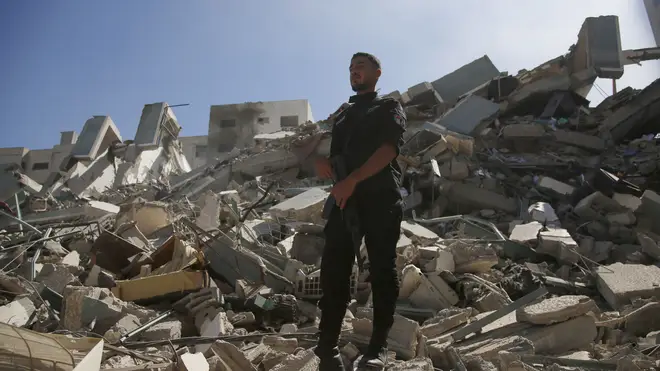
Tonight with Andrew Marr 6pm - 7pm
16 May 2021, 15:24

The US news agency’s offices in Gaza City were destroyed in an Israeli airstrike on Saturday.
An Israeli airstrike on Saturday targeted and destroyed a high-rise building in Gaza City that housed the offices of The Associated Press and al-Jazeera, as well as other media outlets.
While the Israeli military said Hamas was operating inside the building and accused the militant group of using journalists as human shields, it provided no evidence to back up these claims.
AP staff and other tenants safely evacuated the building after the military telephoned in a warning shortly before three heavy missiles struck the 12-storey building, collapsing it in a giant cloud of dust.

Fares Akram was the last AP journalist to escape and described events as they unfolded:
My colleagues’ shouts awakened me, and the pounding of my heart drowned out the racing of my mind. What was happening? Had someone been injured on the streets of Gaza City, or worse?
It was 1.55pm on Saturday. I had been napping on the upper floor of the two-floor penthouse that served as The Associated Press’ offices in Gaza City since 2006.
This was not unusual in recent days; since fighting began earlier this month, I had been sleeping in our news bureau until early afternoon, then working through the night.
I hurried downstairs and saw my colleagues donning helmets and protective vests. They were shouting: “Evacuation! Evacuation!”
The Israeli military, I would learn later, had targeted our building for destruction and offered up a brief advance warning.
They had taken out three buildings so far this week, warning residents and occupants sometimes minutes beforehand to get out.
Hurriedly, I was told: You have 10 minutes.

What did I need? I grabbed my laptop and a few other pieces of electronics.
What else? I looked at the workspace that had been mine for years, brimming with mementos from friends, family and colleagues.
I chose just a handful: a decorative plate bearing a picture of my family. A coffee mug given me by my daughter, now living safely in Canada with her sister and my wife since 2017. A certificate marking five years of employment at AP.
I started to leave. Then I looked back at this place that had been my second home for years. I realised this was the last time I might ever see it. It was just after 2pm. I looked around. I was the last person there.
I put on my helmet. And I ran.
After the most unsettling of days in the community where I was born and raised and now cover the news — in the place where my mother and siblings and cousins and uncles live — I am home now.
I wish I could say I am safe here, but I can’t. In Gaza, there is no safe place.
On Friday, an airstrike destroyed my family farm on the northern edge of Gaza. And now, my Gaza City office — the place that I thought was sacrosanct and would go untargeted because both AP and al-Jazeera’s offices were located on its top floors — is a pile of rubble and girders and dust.

In our building, the clock in my head felt deafening as I ran out of the office. I ran down the 11 floors of stairs and into the basement parking garage.
Suddenly I realised: My car was the only one there. All others had evacuated. I threw my belongings in the back, jumped in and drove off.
When I felt I was far enough away, I parked the car and got out, making sure I had a view of my building. I found my colleagues nearby. They were watching, waiting for what was next.
Nearby, our building’s owner was on the phone with the Israeli military officer who had told him to get the place evacuated. The owner was begging for a bit more time. No, he was told. That won’t be possible. Instead, he was told: Go back into the building and make sure everyone’s out. You have 10 minutes. You’d better hurry.
I turned towards our building to watch. I was praying that maybe, maybe it wouldn’t happen.
I thought of the families that lived on the upper five floors of the building, below the media bureaus and above the offices on the lower floors. What would they do? Where would they go?
Other journalists clustered around, just at the edge of safety, steeled for what was next. My intrepid video colleagues tended to their live shot.
Then, in quick succession over the next eight minutes: a small drone airstrike, followed by another and another. And then three powerful airstrikes from F-16s.
At first, it looked like layers of something collapsing. I thought of a bowl of potato chips, and what might happen if you slammed a fist into them. Then the smoke and dust enveloped everything. The sky rumbled. And the building that was home to some people, an office to others and both to me disappeared in a shroud of dust.
In my pocket, I still had a key to a room that no longer existed.